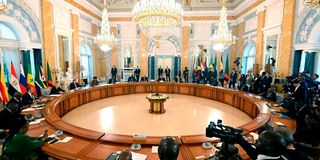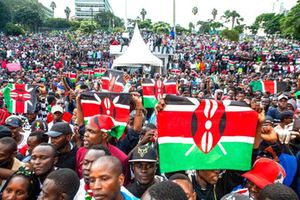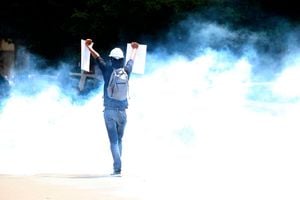African leaders demand ‘end’ to Russia-Ukraine war

Russian President Vladimir Putin (left) attending a meeting with delegations of African leaders at the Constantine (Konstantinovsky) Palace in Strelna, outside Saint Petersburg on June 17, 2023.
African leaders left Moscow late on Saturday unsure of how long the Russia-Ukraine war would go on, even after tabling a ten-point proposal to end the conflict.
The leaders including African Union Chairperson and Comoros President Azali Assoumani, South Africa’s Cyril Ramaphosa, Senegal’s Macky Sall and Zambia’s Hakainde Hichilema had met with Russian counterpart Vladimir Putin over concerns the war was raising the cost of living in Africa.
But they may wait longer to know if both sides will agree to their mediation proposals. Mr Putin told his African audience the food crisis was caused by the West, for imposing sanctions on his country and ignoring the root causes of the war.
Russia, and Ukraine, had been Africa’s biggest source of wheat and fertiliser. But since Russia invaded Ukraine last year, the West led by the US have been ramping up sanctions on Moscow, cutting its banks from international system, sanctioning some firms and oligarchs as well as frustrating trade in a bid to reverse Russia’s war trajectory.
“Let me stress once again that we are open to constructive dialogue with everyone who wants peace to be achieved based on the principles of justice and consideration of the legitimate interests of the parties,” said Putin at a session with African leaders in St Petersburg, Russia on Saturday. He waived to the audience some deal his country had reached with Ukraine, but which he argued they refused to accept, prolonging the war.
The African delegation also included Egypt’s Prime Minister Mostafa Madbouly, Congo’s Ministerial Representative Florent Ntsiba, and Special Envoy of the President of Uganda and former Prime Minister Ruhakana Rugunda.
Earlier on Friday, the African leaders met Ukrainian President Volodymyr Zelensky, who vowed he would not enter talks with Russia while they occupied Ukrainian land. The Ukrainian leader argued for the ‘Peace Formula’ and invited the African leaders to take part in a Global Peace Summit which Ukraine is organising.
“The Second is the crimes committed by Russia. I called on the participants of our meeting to present their vision of how to overcome their consequences and prevent any repetition,” Zelensky said in a video message on Telegram after the meeting.
“But first of all, we must restore the full force of the UN Charter and stop the brutal Russian aggression and free our land, our people from Russian imperial evil. This requires a global effort.”
President Putin, on the other hand, insisted Ukraine had always refused talks and told African leaders Russia should not be blamed. Moscow, he argues, is only protecting everything Russian, including Russian-speaking communities in Ukraine he argues have been targeted for elimination.
Putin could be seen hagging and chatting with the African leaders before the meeting formally began. It was a contrast with Zelensky who on Friday met with the leaders while dressed in his usual military jungle-green t-shirt and trousers, and boots. During the meeting in Kyiv on Friday, various media outlets reported the missile strikes in areas near the venue, although the South African Spokesperson for the President Vincent Magwenya said he had heard none.
On Saturday, Russian Foreign Minister Sergey Lavrov told the media briefing after the meeting that Moscow will be ready for talks but as long as Ukraine does agree to its demands which he said have been consisted throughout the war.
“The main conclusion from the today’s conversation is that our partners from the African union have displayed an understanding of the roots of the crisis, which was created through the efforts of the West,” Lavrov said.
“This situation must be handled by addressing these fundamental causes and working out special specific actions to eradicate what has for many years been undermining a just security on the European continent.” Part of that beef has been Russia’s opposition to Ukraine joining the North Atlantic Treaty Organization (NATO), a mutual defence collaboration bloc of the West.
For Africa, however, the dispute need not to have gone to war.
“Wars have always had dire consequences, and the longer they last, the deeper and more unprecedented their consequences are. We will not teach you anything new about this, because your country has experienced many painful events in the past,” said President Assoumani of the Comoros.
“Let me stress that Africa’s mediation efforts will be mediation in the name of peace. We would like to remind you that in a globalised world that we live in, if a country or a region is affected by a crisis – regardless of its nature, and we know a lot about this – the whole community of countries faces a threat.”
The leaders arrived in Moscow a year after the African Union, then chaired by President Sall, prevailed upon Putin to agree to some grain exports deal. The deal would later be agreed in Istanbul and known as the Black Sea Initiative, with the UN, Ukraine and Turkey involved. Russia says up to 30,000 tons of fertilizer have been exported to Africa free of charge. But Putin blames the west for crippling trade in grain.
In St Petersburg, President Ramaphosa presented a ten-point proposal to solve the conflict including a cessation of hostilities and what he called a total respect to the UN Charter and protection of civilians and the vulnerable.
“Children are sacred. We moved them out of the conflict zone, saving their lives and health,” President Ramaphosa said.
“The war cannot go on forever. All wars have to be settled and come to an end at some stage. And we are here to communicate a very clear message that we would like this war to be ended,” he added.
His Senegalese counterpart added: “Mr President, we insist that, despite the situation on the ground, in military terms, it is nevertheless important to maintain channels for dialogue, for discussion, so that at least humanitarian issues become our priority and so that all other aspects of reconciliation can be discussed.
“It seems to me that humanitarian efforts should be intensified, in particular in regard to POW (prisoners of war) exchanges and issues affecting civilians. I think we can have a detailed discussion of these issues.”






